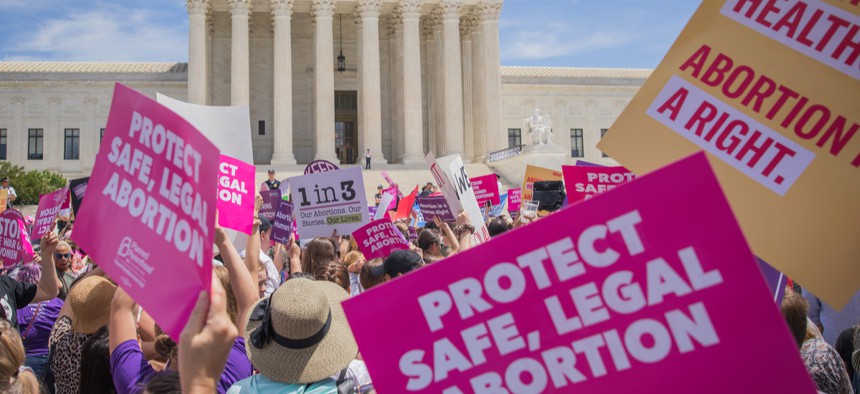Coalition of Prosecutors and Attorneys General Say They Won’t Enforce Laws Criminalizing Abortion if Roe v. Wade is Overturned

A protest in support of abortion rights outside the Supreme Court in May 2019. Shutterstock
STATE AND LOCAL ROUNDUP | Boston finalizes police reforms … San Diego purchases hotels to house homeless people … NYC Mayor asks ICE agents to stop falsely identifying themselves as members of the NYPD.
A group of 53 local prosecutors and 10 state attorneys general released a statement on Wednesday saying that they would not enforce laws that criminalize abortion even if the Supreme Court overturns Roe v. Wade. The announcement comes as the U.S. Senate questions Judge Amy Coney Barrett, who was recently nominated to the high court by President Trump. Reproductive rights activists fear Barrett will rule against the constitutional right to abortion in cases that challenge the landmark decision from 1973. The prosecutors said that declining to prosecute laws criminalizing abortion is about "protecting the integrity of our justice system and upholding the Constitution and rule of law." The group said that “not all of us agree on a personal or moral level on the issue of abortion” but “what brings us together is our view that as prosecutors we should not and will not criminalize healthcare decisions such as these—and we believe it is our obligation as elected prosecutors charged with protecting the health and safety of all members of our community to make our views clear.” The attorneys general signed onto the statement include those from Delaware, California, Massachusetts, Illinois, and Pennsylvania. Delaware Attorney General Kathleen Jennings said that she was motivated to sign the statement because of state laws passed in recent years that curtail the right to abortion. [Washington Post; ABC News]
POLICE REFORM | Boston Mayor Marty Walsh and Police Commissioner William Gross committed to a series of police reforms recommended by a task force appointed after the police killing of George Floyd in May in Minneapolis. The changes they pledged to make include the establishment of an independent police oversight office with full investigative and subpoena power, the creation of a diversity and inclusion unit within the Boston Police Department, the expansion of body camera use and a ban on facial recognition software, the strengthening of use of force standards, and the adoption of practices to increase transparency and accountability. "I accept and endorse each of these principles," Walsh said. "I will use every tool at my disposal to make this a reality." Carol Rose, executive director of the ACLU of Massachusetts, commended the efforts, but cautioned that the changes have yet to be implemented. “As we said when the recommendations were first proposed, it remains to be seen whether the policies will be implemented over likely objections from police unions, and how much it will inflate the police department’s already enormous budget. Policymakers' work has only just begun; the Mayor must enact and enforce these recommendations, and the state legislature must pass legislation to reform policing across Massachusetts.” Tanisha Sullivan, president of the NAACP Boston Branch and a member of the police reform task force, agreed that the reforms should be a first step. “This is accomplished with a deep understanding and acknowledgement that it’s not enough to say that racism will not be tolerated,” said. “We must actively, intentionally, and consistently work to make sure it has no place or space to take root.” [NBC Boston; Boston 25 News]
HOMELESS HOTELS | The San Diego City Council approved the purchase of two hotels that the city wants to convert into permanent housing for 400 people currently living in a temporary shelter at the city’s convention center. The shelter in the convention center was opened in April to provide more space for shelter residents with the hope of mitigating some of the spread of coronavirus. Several community members, including nearby hotel owner Bravesh Patel, spoke in favor of the plan to move people from the convention center to the hotels. “I found that the acquisition of the Residence Inn on Hotel Circle is a great move by the city in order to get these people the help that they need and also to get them the shelter we should be providing them,” he said. San Diego Mayor Kevin Faulconer applauded the hotel purchases, which combined cost around $107 million. “Allowing people to live unsafely on the streets is not okay,” he said. [San Diego Union Tribune]
NYPD IDENTIFICATION | New York City Mayor Bill de Blasio sent a letter to U.S. Immigration and Customs Enforcement asking them to ban ICE officers from falsely identifying themselves as members of the New York Police Department, saying that this kind of misrepresentation “creates fear” and drive crime witnesses “into the shadows.” The city has received several reports of ICE agents telling people they are police officers or members of the city’s narcotics team in order to make arrests or gain entry to homes for searchers. [NBC New York; ABC New York]
FREE INTERNET | Los Angeles is launching a new initiative to give six months of free internet access to 9,000 people living in public housing throughout the city. Mayor Eric Garcetti said that the initiative will make sure public housing residents “no longer find themselves on the wrong side of the digital divide” and have access to virtual classrooms and other online opportunities. “Covid-19 has reinforced what was already a clear and unmistakable fact: internet connectivity is not a luxury in our time — it’s an absolute necessity for parents trying to work, students looking to learn, and families and friends seeking to communicate,” Garcetti said. [Los Angeles Daily News]
Emma Coleman is the assistant editor for Route Fifty.
NEXT STORY: As Californians Get Older and Less Mobile, Fires Get Hotter and Faster






